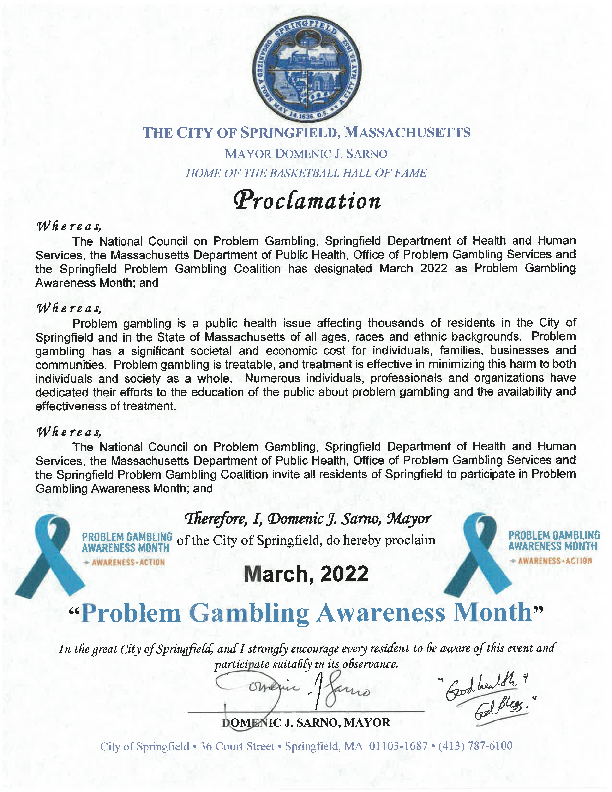To further advance community awareness of problem gambling, Mayor Sarno issued a proclamation declaring March 2022 as ‘Problem Gambling Awareness Month in the city of Springfield’.
Problem gambling is defined as all gambling behavior patterns that compromise, disrupt or damage personal, family or vocational pursuits. According to recent research an estimated 83,200 to 135,100 or 2% of Massachusetts adults experience problem gambling and an estimated 389,700 to 488,500 or 8.4% of Massachusetts adults are at-risk gamblers, demonstrating gambling behaviors that put them at-risk for developing a problem gambling disorder, (Williams, RJ, et al, 2017).
“Across Springfield this March during Problem Gambling Awareness Month, Springfield Department of Health and Human Services, organizations funded by the Massachusetts Department of Public Health, Office of Problem Gambling Services and Springfield Problem Gambling Coalition are committed to making sure the public understand what the signs of problem gambling are, and most importantly, the resources that are available to get help,” said Helen Caulton-Harris, Commissioner of Springfield Department of Health and Human Services.
Mayor Sarno stated, “I want to acknowledge and thank Health and Human Services Commissioner Helen Caulton-Harris and her team for their continued dedicated efforts in addressing this public health concern and helping to increase awareness and provide outreach and education on the resources that are available. This COVID-19 pandemic has created many challenges but my administration is committed to working together with our state and local partners, with an emphasis on public health, as we continue to move our city of Springfield forward for the betterment of all our residents and business community.”
Research shows that men are at higher risk than the general population for problem gambling, as are people of color and people with a history of substance misuse (Johansson, A., et.al. 2009). As one Springfield resident shares about his personal journey of substance misuse addition and problem gambling: “I remember watching TV in the rehab group room and the lottery came on. [I thought] let me play my recovery day date. Then I hit for a couple of hundred dollars. I was hooked, this was my new addiction. I had no idea I substituted one addiction for another.” - Anthony B
Problem Gambling Awareness Month brings together a wide range of stakeholders, including public health organizations, treatment providers, and advocacy groups who participate in the Springfield Problem Gambling Coalition including: Springfield Department of Health and Human Services, Office of Problem Gambling Prevention and the CHW Pilot project funded by the Massachusetts Department of Public Health Office of Gambling Services; Gándara Center Problem Gambling Ambassador Program and Photovoice Program, both project funded by the Massachusetts Department of Public Health Office of Gambling Services; MHC Problem Gambling Ambassador Program, project funded by the Massachusetts Department of Public Health Office of Gambling Services; Martin Luther King Jr. Community Center, Photovoice Program, project funded by the Massachusetts Department of Public Health Office of Gambling Services, Massachusetts Council on Gambling and Health and GameSense.
Organizations of the Coalition work collaboratively to let people know that hope and help exist. For more information about problem gambling and events planned for Problem Gambling Awareness Month please contact Theresa Glenn at (413) 750-2065 or tglenn@springfieldcityhall.com.
If you or someone you know has a gambling problem, call the Massachusetts Substance Use HELPLINE at 1-800 327-5050 or visit www.helplinema.org. The Helpline is the only statewide, public resource for finding substance use treatment, recovery, and problem gambling services. Trained specialists are available 24 hours a day, 7 days a week for confidential help.
Another excellent resource for help with problem gambling is the GamLine of the Massachusetts Council on Gaming and Health. Call 1-800-GAM-1234 24/7 or go to macgh.org chat with a trained counselor to learn about problem gambling, the MA voluntary Self-Exclusion program, or to get general information.
About SDHHS, Office of Problem Gambling and Prevention
The Department of Health and Human Services provides environmental health, community nursing, health education and other services for the city of Springfield.
SDHHS’s Office of Problem Gambling Prevention (OPGP) supports a comprehensive public health response to problem gambling. The Office of Problem Gambling Prevention approach is community-oriented and is rooted in the social determinants of health, with a racial equity lens.
About the Springfield Problem Gambling Coalition
The Springfield Problem Gambling Coalition’s mission is to increase problem gambling awareness, education and to advocate for treatment on problem gambling. Our goal is to provide up-to-date local information and links to other Resources. Comprised of local and statewide agencies, the Coalition seeks to inform residents about local resources to mitigate problem gambling.
About The Office of Problem Gambling Services, Massachusetts Department of Public Health
Within MDPH, the Office of Problem Gambling Services (OPGS) ensures a comprehensive and integrated public health response to problem gambling by using data to inform initiatives, engaging communities, and ensuring cultural intelligence and humility.
About the National Council on Problem Gambling NCPG is the national advocate for people and families affected by problem gambling. NCPG is neutral on legalized gambling and works with all stakeholders to promote responsible gambling. For information on NCPG’s 35th National Conference on Gambling Addiction & Responsible Gambling, visit www.ncpgambling.org/conference.
References
Williams, RJ, et al, Zorn, M. Volberg, RA, Stanek, EJ, Freeman, J, Maziya, N., Naveed, M, Zhang, Y, Pekow, PS, (2017) Gambling and Problem Gambling in Massachusetts: In-Depth Analysis of Predictors. Amherst, MA: School of Public Health & Health Sciences, University of Massachusetts Amherst.
Johansson, A., Grant, J. E., Kim, S. W., Odlaug, B. L., & Götestam, K. G. (2009). Risk factors for problematic gambling: A critical literature review. Journal of Gambling Studies, 25, 67–92.
Petry, N. M., Stinson, F. S., & Grant, B. F. (2005). Comorbidity of DSM-IV pathological gambling and other psychiatric disorders: Results from the National Epidemiologic Survey on Alcohol and Related Conditions. Journal of Clinical Psychiatry, 66, 564–574
